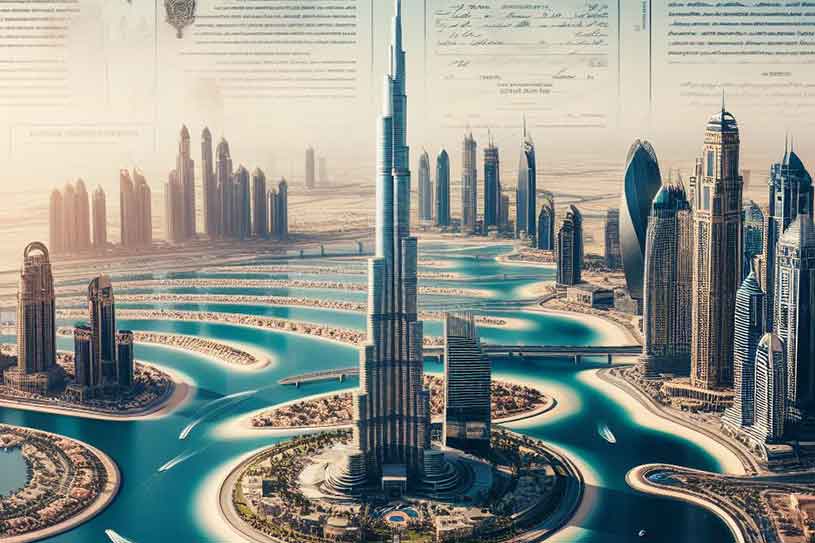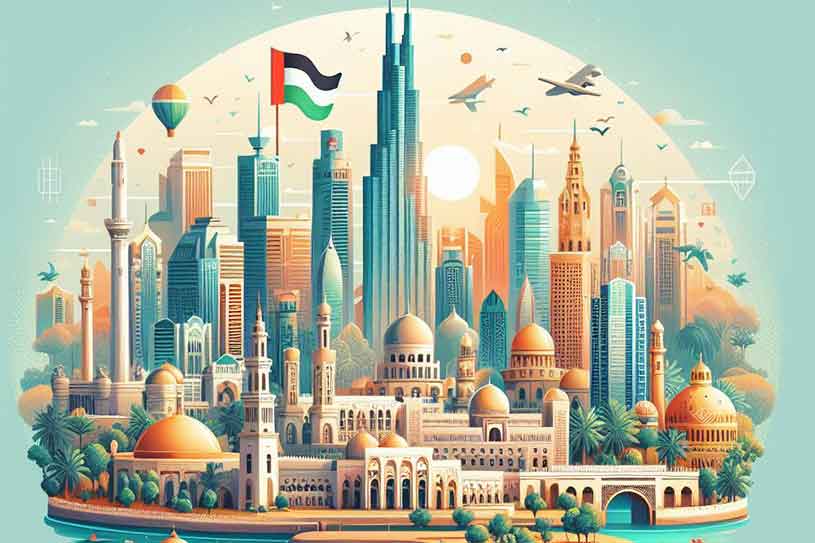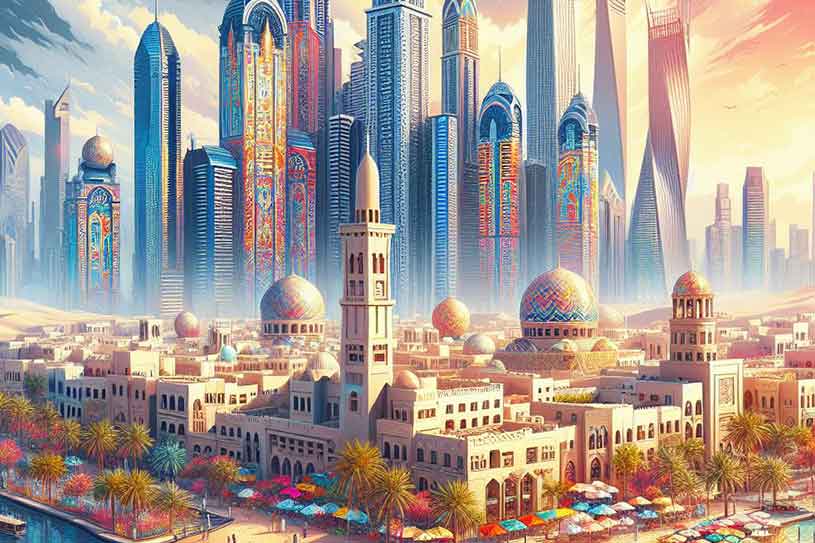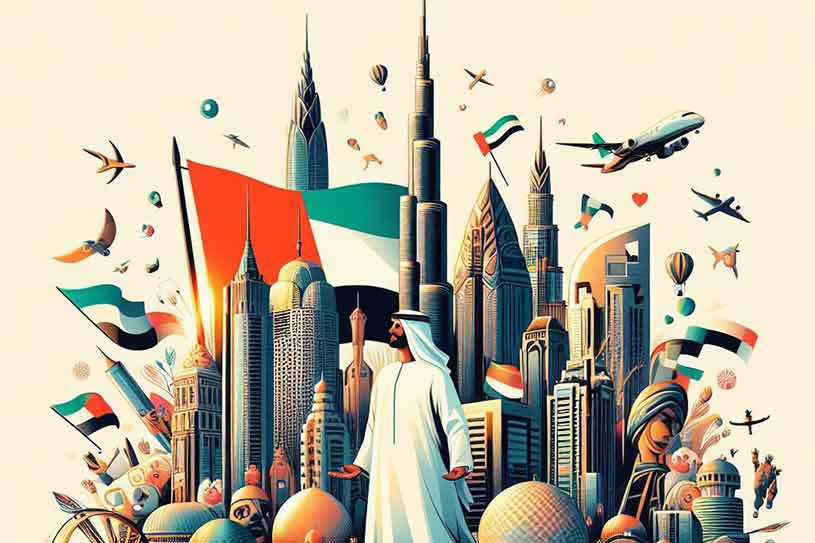Welcome to Dubai – The City of Superlatives
Dubai is often described using superlatives – the biggest, tallest, most luxurious. The fast-paced development of this city in the United Arab Emirates has led to iconic architecture, world-class infrastructure, and extravagant attractions that make it a globally renowned tourist destination.
From Humble Beginnings to Cosmopolitan Metropolis
Dubai’s history stretches back to its establishment as a small fishing village in the early 18th century. The local economy was based on pearl diving and sea trade. Its strategic location on the Persian Gulf coast attracted merchants from all over to trade and settle in Dubai.
The influential Al Maktoum dynasty took over rulership in 1833 and played a key role in developing Dubai into a major trading hub in the 1900s. The discovery of oil brought an economic boom in the later 20th century, allowing investment in infrastructure and the diversification of the economy into sectors like real estate, tourism, transportation and financial services.
Today, Dubai is the most populous and second largest city in the UAE, with over 3 million residents from more than 200 nationalities. It continues to consolidate its position as the business and tourism capital of the Middle East.

Experience the Best of Sun, Sea and Desert
Dubai enjoys a sunny subtropical desert climate all year round, with hot summers and mild winters. Average temperatures range from 25°C in January to 40°C in July.
It has natural beaches along its Persian Gulf coastline, as well as several man-made islands. Palm Jumeirah, the iconic artificial archipelago in the shape of a palm tree is one of the top attractions.
The desert starts just beyond the city. Dune bashing on desert safaris, camel rides, falconry and stargazing in the sand dunes are popular activities for tourists. The contrast between the ultramodern city and expansive desert wilderness adds to Dubai’s appeal.
Shop and Feast in a Cosmopolitan Paradise
Dubai truly epitomizes multiculturalism with traditional bazaars and souks coexisting alongside ultramodern, air-conditioned malls housing international designer boutiques. Shopaholics can indulge themselves all year round, especially during the annual Dubai Shopping Festival.
As a global hub, Dubai offers an incredible variety of cuisines. From street food to Michelin star dining, there are restaurants catering to all tastes and budgets. Food enthusiasts should attend the annual Dubai Food Festival to experience local Emirati fare as well as global cuisines.
Architectural Wonders and World-Class Infrastructure
The postcard image of Dubai is undoubtedly the dazzling cityscape of futuristic skyscrapers. Iconic structures like the 828m high Burj Khalifa, the distinctive sail-shaped Burj Al Arab hotel and the Dubai Frame golden picture frame built over an artificial lake have come to symbolize the city.
Connecting all these modern marvels is a convenient, efficient infrastructure of roads, metro lines, trams, buses and taxis. Dubai International is world’s busiest airport for international passenger traffic. The extensive road network enables easy self-drive holidays for visitors.
A Global Oasis for Business and Events
Strategic policies and infrastructure have enabled Dubai to become a thriving global center for business and finance. Over 20,000 international companies have offices here due to the low tax rates, advanced facilities, connectivity and liberal business environment.
Dubai also plays host to numerous high profile events and conferences annually like the Dubai Airshow, Gulfood exhibition, Arabian Travel Market, Dubai Design Week and various industry expos. These contribute significantly to business tourism.
The 6 month Dubai Expo 2020 showcased the city’scapabilities. Its success has led to theExpo site being converted to District 2020, an integrated urban destination focusing on cutting edge innovation.
Enjoy Leisure and Entertainment
This luxurious city offers plenty of activities catering to different interests beyond shopping and dining. Adrenaline junkies can enjoy activities like skydiving, ziplining, go-karting, water sports and theme park rides.
Cultural aficionados can tour the Al Fahidi historical district or Bastakiya Quarter with restored traditional houses. Art galleries and events like Dubai Art Season promote upcoming talent from the region and globally.
Dubai also has a buzzing nightlife scene with lounges, clubs and bars, predominantly in luxury hotels due to liquor licensing laws. Sunsets at trendy beach clubs provide picturesque views.
An Ongoing Legacy
Dubai has exceeded expectations with its rapid growth driven by innovation. However, traditions dating back centuries still have an important influence, from the Rolex-sponsored camel racing and annual shopping festivals to the gold, spice and textile souks dotting the old city quarters by the Creek.
As the city continues to build its brand as the ultimate luxury holiday escape, the rulers balance widespread liberalism with elements of the Islamic heritage. Ultimately the continued economic success makes Dubai a land of opportunities, attracting enterprising expatriates from around the world.
Faqs:
FAQs About Dubai
Q1: What is the history of Dubai? A1: Dubai has a rich history that began as a fishing and pearling village. It saw the establishment of the Al Maktoum dynasty in 1833, transformed into a trade hub in the early 20th century, and experienced an economic boom after the discovery of oil. The city diversified into real estate, tourism, transportation, and more over the years, resulting in its modern metropolis status.
Q2: Where is Dubai located, and what is its climate like? A2: Dubai is located on the Persian Gulf coast of the United Arab Emirates (UAE). It has an arid desert climate with significant temperature ranges between summer and winter. Rainfall is minimal, and Dubai is known for its beautiful coastline and beaches.
Q3: What are the key sectors of Dubai’s economy? A3: Dubai’s economy is driven by trade, tourism, real estate, and finance. The city’s infrastructure and economic policies have attracted businesses, and it is home to various free trade zones, markets, and business districts. Additionally, Dubai is a significant hub for banking and financial services.
Q4: How is Dubai governed, and what are its legal aspects? A4: Dubai is a constitutional monarchy led by the Al Maktoum family. It has an independent judiciary system, low crime rates, and strict decency laws. Despite this, it maintains a sense of liberalism and tolerance towards expatriates.
Q5: What is the society and culture like in Dubai? A5: Dubai boasts a multicultural population, with expatriates forming the majority. While Islam is the main religion, there is freedom of religion, and Arabic is the official language, with English commonly used. The cuisine reflects global influences, and you can find traditional arts and music alongside modern entertainment.
Q6: What are some major attractions and activities in Dubai? A6: Dubai offers a plethora of attractions and activities, including architectural marvels like the Burj Khalifa and Burj Al Arab. Visitors can enjoy beaches, parks, resorts, and shopping malls. Adventure enthusiasts can engage in desert safaris, dune bashing, and water sports. Additionally, Dubai hosts events like the Dubai Shopping Festival.
Useful Links
How to change the mobile number registered with your Emirates ID in Dubai/UAE


